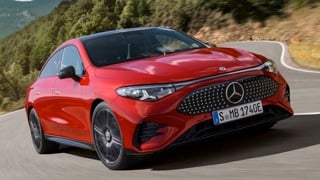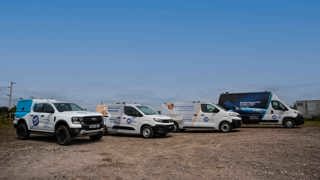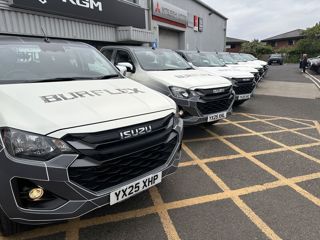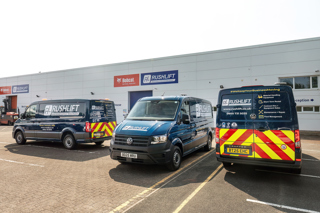Fleet dominates the TrustFord business, while TrustFord dominates Ford’s fleet business. Around 40% of the dealer group’s 100,000-plus annual car and light commercial vehicle registrations are acquired by the fleet sector, which equates to more than 35% of Ford’s UK true fleet sales.
TrustFord chairman and chief executive Steve Hood says: “We try and specialise in it ; it’s a strategic pillar for TrustFord. And it’s the fastest growing area of our business. We grew 20% year-on-year in fleet and we were up 30% on commercial vehicle sales.”
Factfile
Organisation: TrustFord
Chief executive: Steve Hood
Fleet and commercial vehicle director: Mark Wilkie
Annual sales: More than 100,000
Fleet sector sales: 40%
With 65 dealerships at 50 locations, TrustFord is the largest retail group to win fleet dealer of the year.
It’s owned by Ford of Europe, but that doesn’t mean it exists to solely appease the manufacturer: according to Hood, TrustFord operates at “arm’s length”, with its own profit and loss, executive board, volume targets and five-year business strategy.
Much of the impetus for its recent growth spurt can be laid at the door of Mark Wilkie, who was appointed fleet and commercial vehicle director at the end of 2014, a year after joining the business. Wilkie rebuilt the fleet operation, first talking to customers and leasing partners about their experiences. He used this insight to create a new service proposition intended to exceed expectations.
Prior to his appointment, the company managed its business with leasing customers on a regional hub basis. This was highlighted as inefficient and often frustrating, resulting in poor communications and incon-sistent service levels. Consequently, Wilkie set up a central fleet team to manage major relationships, including admin and reporting, making the process more efficient and convenient, as Hood explains.
Fleet News: What has been the impact of centralising the fleet team?
Steve Hood: We have changed our processes and consolidated purchasing. Our national team means we can be a one-stop shop for customers, but they can also still have relationships with a regional hub with support from the national team. It means we can offer a consistent service across all regions. The team coordinates all the business centres to ensure this consistency and they also have expertise to look after leasing companies. It hasn’t just been organisational change; it’s been cultural change for the business centres as well.
FN: The changes also affect aftersales – how will this benefit fleets?
SH: We have a specific national fleet booking team which we believe is best-in-class – our confirmation time is 3.5 minutes on average . We have a supportive policy for fleet customers if they need to get their vehicle through our dealership quickly. We also open 7am until 7pm all five weekdays and until 1pm on Saturday – that will be extended once we have the necessary demand. We also have late night opening on Thursday as a minimum and in London, at our Edgware Road site, we have a third shift which operates until 3am. We recognise that aftersales support is very important for fleets; it’s all about keeping them moving.
FN: What other aftersales initiatives have you introduced?
SH: We have mobile vans which we can send to the customers’ premises or we can even put our own technicians into the customer’s workshop to do the work for them. We will have eight vans in London and will then roll them out across our network.
Parts are also important. We have order times until 5pm and we run six deliveries a day, so we can turn vehicles around more quickly. We have put telematics in our vans, so we know where they are and whether they can make the delivery times. This helps us to understand the pinch points and re-route if necessary.
As the price of telematics comes down it could be something that we fit to all our customers’ vans as standard. It could revolutionise customers’ understanding of their vans and the data could be used for preventative maintenance, particularly with extended servicing where we will have to adapt our services.
FN: Ford is a major player in fleet: how do you plan to take advantage of the opportunities that exist?
SH: If we are going to maximise the potential of the Ford franchise, we need to specialise in retail, fleet, commercial vehicles and parts. In fleet, we want to grow our volume everywhere – leasing, corporates and SMEs; cars and commercial vehicles. Fleet has advantages because it’s less cyclical than retail. The negotiations are tough but we have a set cost base so we can manage customers’ needs. If you put the resource in and know what customers want, it becomes a great business.
Leasing companies have an increasingly important role acting as consultants . We pride ourselves on having good relationships with them – we are the preferred supplier for most of the top 10. We have to deliver on our service level agreements and they want a national relationship, not individual relationships – that’s a change. But we have different customers – leasing companies, fleets, company car drivers – so we have to be mindful that someone is using the vehicle and everyone has to align to keep them mobile and satisfied. In many ways we are the face of everyone – fulfilling all the customer needs.
FN: How have you seen fleets’ requirements change in recent years?
SH: We are seeing more specialism in what the vehicles are used for, so we’re making sure they are fit for purpose and have the correct specification and fit-out. The PDI is more complex and disciplined for vans and this is where we have raised our game.
Company car drivers expect more of a retail experience and we have done a lot of work on our delivery systems, such as a proper handover, even if it doesn’t take place in the dealership. It makes them feel valued as a customer.
FN: What about the market for used vans?
SH: It’s a growing area for SMEs. We are investing in refurbishment facilities to take back two- and three-year-old vehicles which we can sell on. There’s a shortage, so we want to create stock. It’s a lower capital cost and the mindset is “a new van is not for me”. They want to pay cash and, as the vans are more reliable, they don’t have service, maintenance and repair issues.
FN: How would you like see your relationships with leasing companies and fleets evolving?
SH: We need to get further away from transaction elements and into the collaboration space because we have common customers. So we want to work as partners and understand each other’s challenges and issues. We want to do the best job we can for customers, so we need to build trust. For example, it is easy to misorder a vehicle; but we deal with it jointly which improves the service for the leasing company and its customers. This approach will help us to take cost out.
TrustFord is investing in its retail network, in some cases setting up dedicated commercial vehicle centres, such as its newest Transit dealership in Dagenham.
Not only do the facilities provide a better environment for customers, they also give staff a lift.
“Our staff have pride in this place. All our technicians washed their tools before they came here and they keep their areas clean,” Hood says. “And it’s a template for a lot of what we have been doing.”
He adds: “It’s a very competitive business and we have to provide more services. The trick is to constantly add more value.”
Judges’ comments
“With a new fleet director at the helm, TrustFord has rebuilt its fleet business, resulting in a significant uplift in sales and the addition of household names to its customer portfolio. It has listened and responded to customers’ needs and is committed to managing vehicle downtime with twilight, night and weekend servicing, as well as mobile servicing units. TrustFord lives up to its promise of ‘getting things done’.”





















Login to comment
Comments
No comments have been made yet.